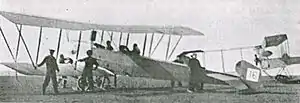Avro 501
The Avro Type H, Type 501, and Type 503 were a family of early British military seaplanes. They were a development of the Avro 500 design and were originally conceived of as amphibious, the prototype being fitted with a single large main float (equipped with wheels) under the fuselage, and two outrigger floats under the wings.
| 501 | |
|---|---|
.jpg.webp) | |
| Role | Military utility seaplane |
| National origin | United Kingdom |
| Manufacturer | Avro |
| First flight | January 1913 |
| Number built | 1 – 501 4 – 503 |
Design and development
Tests were conducted on Windermere in January 1913. It was later converted to a twin-float configuration and bought by the British Admiralty. It now, however, proved too heavy and was converted again – this time to a landplane.[1]
An improved version, designated the 503 was demonstrated to the Inspector of Naval Aircraft, who placed an order for three machines. The prototype itself was demonstrated for the Imperial German Navy in its seaplane trials in June 1913 and was purchased by the government of the German Empire for evaluation purposes. This machine subsequently became the first aircraft to fly across the North Sea, from Wilhelmshaven to Heligoland, in September 1913. Gotha purchased a licence from Avro and produced the type as the WD.1 (Wasser Doppeldecker – "Water Biplane").[1] Unlicensed copies were also built by Albatros, AGO, Friedrichshafen. Some WD.1s were provided to the Ottoman Empire following their withdrawal from German navy service.[2]
Operators

- Kaiserliche Marine – one aircraft.
Specifications (501 seaplane)
Data from Avro Aircraft since 1908[4]
General characteristics
- Crew: one pilot
- Capacity: one observer or passenger
- Length: 33 ft 0 in (10.06 m)
- Wingspan: 47 ft 6 in (14.48 m)
- Height: 12 ft 6 in (3.81 m)
- Wing area: 478 sq ft (44.4 m2)
- Empty weight: 1,740 lb (789 kg)
- Gross weight: 2,700 lb (1,225 kg)
- Powerplant: 1 × Gnome Omega Omega 14-cyl two row air-cooled rotary piston engine , 100 hp (75 kW)
Performance
- Maximum speed: 55 mph (89 km/h, 48 kn)
See also
Related lists
References
- Jackson, A.J. (1990). Avro Aircraft since 1908 (Second ed.). London: Putnam. ISBN 0 -85177-834-8.
- Gray, Peter; Thetford, Owen (1970). German Aircraft of the First World War (2nd ed.). London: Putnam. p. 397. ISBN 0-370-00103-6.
- Thetford, Owen, British Naval Aircraft Since 1912: Sixth Revised Edition, Annapolis, Maryland: Naval Institute Press, 1991, ISBN 1-55750-076-2, p. 400.
- Jackson 1990, p. 51.
Further reading
- Taylor, Michael J. H. (1989). Jane's Encyclopedia of Aviation. London: Studio Editions. p. 91.
- World Aircraft Information Files. London: Bright Star Publishing. pp. File 889 Sheet 93.
External links
| Wikimedia Commons has media related to Avro 501. |
- Avro 501 – British Aircraft Directory
